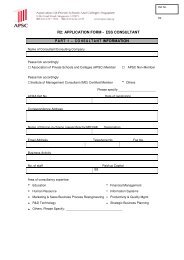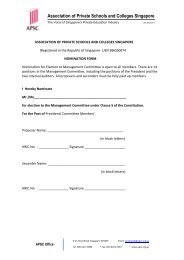A New Dynamic: Private Higher Education
A New Dynamic: Private Higher Education
A New Dynamic: Private Higher Education
- No tags were found...
Create successful ePaper yourself
Turn your PDF publications into a flip-book with our unique Google optimized e-Paper software.
Financial consideration2education per se and would like to attend higher education regardless of employmentprospects. This is the case in China, Japan and the Republic of Korea.Students and their parents have a strong interest in the reputation of the privateprovider. Some of the questions they will ask are: Are its degrees respected in themarket place? Will an award from the institution bring a higher chance of gainingemployment? What are the class sizes and are the infrastructure and equipment upto date? To some extent these issues will be covered by a sound QA regime and thestudents will suffer if government is failing to effectively manage its regulatory and QAprocesses. Where the QA processes do work effectively, not only can they providestudents and parents with the comfort they require, but they can also strengthen thepublic system, where the private providers have higher standards than their publiccounterparts. The use of academic staff from the public sector as trained qualityreviewers means that they may well benefit personally from the experience of visitingand reviewing any private institutions of a higher quality.Other stakeholders to be considered are the public institutions. Their biggestquestion is whether they should collaborate or compete with the private sector. Inmany countries, academic staff from publicly-funded institutions teaches in the privatesector and this is sometimes encouraged by the leaders of the public universities as ameans of giving their staff an extra source of income. Indeed, in Argentina, wheresalaries in the state sector are very low, academic staff relies on the income they earnfrom working in private institutions to make a reasonable living. In countries such asBangladesh, some of the best private sector universities are better equipped thantheir public counterparts and their pedagogy is heavily reliant on input from partnersin the United Kingdom or the United States. Thus, in some respects they may beoffering a higher quality education to their students in an environment that is free ofpoliticization and student unrest. This can present the state-funded institutions with acompetitive challenge and the private sector's fresh approach or innovative pedagogyis sometimes seen by governments as a reason for encouraging the entry of privateproviders into national systems.There are also less welcome financial challenges from the private sector institutions,in that they are usually able to pay their academic staff higher salaries than the statecan afford. Taking all benefits into account, however, this salary is usually seen ascompensation for the private institutions' inability to match the public sector'sprovision of staff housing and other benefits, such as pensions.33












